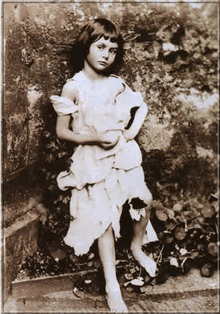
The real superhuman, man or woman, is the person who's rid himself of all prejudices, neuroses, and psychoses, who realizes his full potential as a human being, who acts naturally on the basis of gentleness, compassion, and love, who thinks for himself and refuses to follow the herd.
Philip José Farmer (January 26, 1918 – February 25, 2009) was an American author, principally known for his science fiction and fantasy novels and short stories, especially those of his Riverworld series.
Quotes

You've beauty, flux, and terror To tell. So've I.
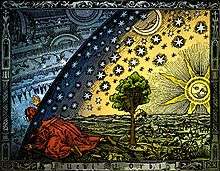
The universe is a big place, perhaps the biggest.
- Can imagination act
Perpendicular to fact?
Can it be a kite that flies
Till the Earth, umbrella-wise,
Folds and drops away from sight?- "Imagination" in America Sings (1949); re-published in Pearls From Peoria (2006)
- Miles above the Earth we know,
Fancy's rocket roars. Below,
Here and Now are needles which
Sew a pattern black as pitch,
Waiting for the rocket's light.- "Imagination" in America Sings (1949)
- Sawbeaked epitome of bodiless
Idea, tossed by gusts of ether, dive
Through abstract mists and raid the sea of fact
Eat rich strange fish, grow long bright feathers, press
Form's flesh around thought's rib, and so derive
From the act of beauty, beauty of the act.- "The Pterodactyl" in Sky Hook #16, (Winter 1952-53); re-published in Pearls From Peoria (2006)
- Beauty in this Iron Age must turn
From fluid living rainbow shapes to torn
And sootened fragments, ashes in an urn
On whose gray surface runes are traced by a Norn
Who hopes to wake the Future to arise
In Phoenix-fashion, and to shine with rays
To blast the sight of modern men whose dyes
Of selfishness and lust have stained our days...- "Beauty in This Iron Age" in Starlanes #11 (Fall 1953); re-published in Pearls From Peoria (2006)
- Reader, pray that soon this Iron Age
Will crumble, and Beauty escape the rusting cage.- "Beauty in This Iron Age" in Starlanes #11 (Fall 1953); re-published in Pearls From Peoria (2006)
- Prometheus, I have no Titan's might,
Yet I, too, must each dusk renew my heart,
For daytime's vulture talons tear apart
The tender alcoves built by love at night.- "In Common" in Starlanes #14 (April 1954); re-published in Pearls From Peoria (2006)
- Oh, I'd reach beyond the comma of you
To the invisible phrase, the dangling Omega! No use. No act
Of mine or mind denies the ante-cerebellum fact
Of furry you, poised fleetingly, bright flex,
Black reflex, too leaping for me to ink and fix
As period to end what has no period, no, no
End...- "Black Squirrel on Cottonwood Limb's Tip" in Skyhook #23 (Winter 1954-55); re-published in Pearls From Peoria (2006)
- We too. No wisdom to utter.
You've beauty, flux, and terror
To tell. So've I. And they're
Very hard to mutter
Through so much chatter and stutter.- "Black Squirrel on Cottonwood Limb's Tip" in Skyhook #23 (Winter 1954-55); re-published in Pearls From Peoria (2006)
- Let those who think the soul is shallow rail,
They must be warned before they dare to leap
They'll plunge into the twilight depths where sweep
In ceaseless thirst great teeth too swift to fail.- "Job's Leviathan" in JD Argassy #58 (1961); re-published in Pearls From Peoria (2006)
- Drowned idols swirl like seeds in chaos' wine.
Look, Job! Caught Beauty, held to light, now apes
A good, now evil, thing — the shifting sign
And spectrum of archaic, psychic shapes.- "Job's Leviathan" in JD Argassy #58 (1961); re-published in Pearls From Peoria (2006)
- The universe is a big place, perhaps the biggest.
- Venus on the Half-Shell (December 1974); written using the pseudonym Kilgore Trout, with the permission of Kurt Vonnegut.
- Though Melville omitted it, Captain Ahab said, "In one sense, Aleister Crowley is lower than whale shit. In another, he's as high as God's hat. The true shaman knows that God's hat is made out of dried whale shit."
- "Farmer on Wilson" an essay on Robert Anton Wilson in Heavy Metal #54 (September 1981)
Sestina of the Space Rocket (1953)
- First published in Startling Stories (February 1953); re-published in Pearls From Peoria (2006)
- One thing is sure, O comrades, that the love
That fights to keep us rooted in the earth,
But also urges us to dare the stars,
This irresistible, this ancient power
Wedged in the soul, unshakable, is the light
That burns our roots and leaves us free for Space.
- The way is open, comrades, free as Space
Alone is free. The only gold is love,
A coin that we have minted from the light
Of others who have cared for us on Earth
And who have deposited in us the power
That nerves our nerves to seize the burning stars.
- Eyes forward! Sing a paean to the light
That God gives us to net the distant stars
In eyes that once were blinded with black earth.
Man had no time for aught but toll, no space
For aught but war. Yet God, in His great love,
Has cleared our eyes and given a hint of Power.
- Yes, we hope to seed a new, rich earth.
We hope to breed a race of men whose power
Dwells in hearts as open as all Space
Itself, who ask for nothing but the light
That rinses the heart of hate so that the stars
Above will be below when man has Love.
- God, Whose hand holds stars, as we lump earth
In our fingers, give us power, give us light
To hold all love within our breast's small space.
Riders of the Purple Wage (1967)
- And there is another feeling, one which he shares with most of humankind. He knows he's screwed up his life, or something has twisted it. Every thinking man and woman knows this. Even the smug and dimwitted realize this unconsciously. But a baby, that beautiful being, that unsmirched blank tablet, unformed [[angel], represents a new hope. Perhaps it won't screw up. Perhaps it'll grow up to be a healthy confident reasonable good-humored unselfish loving man or woman. 'It won't be like me or my next-door neighbor,' the proud, but apprehensive, parent swears.
- Of Chib
- Yesterday's monomaniac is tomorrow's messiah…
- Strong blasphemers thrive only when strong believers thrive.
- Grandpa Winnegan
The Riverworld series
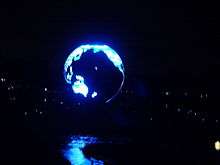
He could see, yet he did not understand what he was seeing.
- Quotes from the Riverworld series of novels and stories, about nearly all of humanity finding themselves resurrected on an alien world, for such reasons or purposes as remains unclear.
To Your Scattered Bodies Go (1971)
- The title of this work is derived from 7th of the "Holy Sonnets" by John Donne:
At the round earth's imagin'd corners, blow
Your trumpets, angels, and arise, arise
From death, you numberless infinities
Of souls, and to your scattered bodies go.
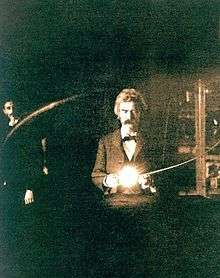
Resurrection, like politics, makes strange bedfellows.
- Won the 1972 Hugo Award. All page numbers from the trade paperback edition published by Del Rey Books
- His wife had held him in her arms as if she could keep death away from him.
He had cried out, "My God, I am a dead man!"- Chapter 1 (p. 1; First lines, depicting the death of Sir Richard Francis Burton).
- Death, the Destroyer of Delights and the Sunderer of Society, had arrived at last.
Blackness. Nothingness. He did not even know that his heart had given out forever. Nothingness.
Then his eyes opened. His heart was beating strongly. He was strong, very strong! All the pain of the gout in his feet, the agony in his liver, the torture in his heart, all were gone.
It was so quiet he could hear the blood moving in his head. He was alone in a world of soundlessness.
A bright light of equal intensity was everywhere. He could see, yet he did not understand what he was seeing. What were these things above, beside, below him? Where was he?- Chapter 1 (p. 1)
- The world took a shape which he could grasp, though he could not comprehend it. Above him, on both sides, below him, as far as he could see, bodies floated. They were arranged in vertical and horizontal rows. The up-and-down ranks were separated by red rods, slender as broomsticks, one of which was twelve inches from the feet of the sleepers and the other twelve inches from their heads. Each body was spaced about six feet from the body above and below and on each side.
The rods came up from an abyss without bottom and soared into an abyss without ceiling. That grayness into which the rods and the bodies, up and down, right and left, disappeared was neither the sky nor the earth. There was nothing in the distance except the lackluster of infinity.- Chapter 1 (p. 3)
- It was like no hell or heaven of which he had ever heard or read, and he had thought that he was acquainted with every theory of the afterlife.
He had died. Now he was alive. He had scoffed all his life at a life-after-death. For once, he could not deny that he had been wrong. But there was no one present to say, "I told you so, you damned infidel!"
Of all the millions, he alone was awake.- Chapter 1 (pp. 3-4)
- In a frenzy, kicking his legs and moving his arms in a swimmer's breaststroke, he managed to fight toward the rod. The closer he got to it, the stronger the web of force became. He did not give up. If he did, he would be back where he had been and without enough strength to begin fighting again. It was not his nature to give up until all his strength had been expended.
- Chapter 1 (p. 4)
- The aerial canoe had no visible means of support, he thought, and it was a measure of his terror that he did not even think about his pun. No visible means of support. Like a magical vessel out of The Thousand and One Nights.
- Chapter 1 (pp. 5-6)
- All the human beings I met were either sure that there would be no afterlife or else that they would get preferential treatment in the hereafter.
- Chapter 4 (p. 17)
- “I did it!” she said. “I...I! I wanted to! Oh, what a vile low whore I am!”
“I don’t remember offering you any money.”- Chapter 8 (p. 54)
- Burton did not believe in miracles. Nothing happened that could not be explained by physical principles — if you knew all the facts.
- Chapter 23 (p. 172)
- Burton, though an infidel, made it his business to investigate thoroughly every religion. Know a man’s faith, and you knew at least half the man. Know his wife, and you knew the other half.
- Chapter 23 (p. 176)
- Burton sighed, laughed loudly, and said, “Plus ça change, plus c’est la même chose.” Another fairy tale to give men hope. The old religions have been discredited — although some refuse to face even that fact — so new ones must be invented.”
- Chapter 23 (p. 179)
The Fabulous Riverboat (1971)
- Resurrection, like politics, makes strange bedfellows.
- First line, spoken by Sam Clemens.
The Dark Design (1977)
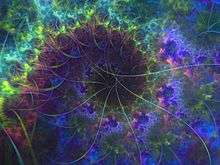
Dreams haunted The Riverworld.
- The title of this work derives from lines in Sir Richard Francis Burton's poem The Kasîdah of Hâjî Abdû El-Yezdî:
And still the Weaver plies his loom, whose warp and woof is wretched Man
Weaving th' unpattern'd dark design, so dark we doubt it owns a plan.
- Dreams haunted The Riverworld.
- First lines.
- I do believe that man is a rope between animal and superman. But the superman I'm thinking of isn't Nietzsche's. The real superhuman, man or woman, is the person who's rid himself of all prejudices, neuroses, and psychoses, who realizes his full potential as a human being, who acts naturally on the basis of gentleness, compassion, and love, who thinks for himself and refuses to follow the herd. That's the genuine dyed-in-the-wool superman.
- Ch. 31
The Magic Labyrinth (1980)
- The title of this work derives from lines in Sir Richard Francis Burton's poem The Kasîdah of Hâjî Abdû El-Yezdî:
Reason is Life's sole arbiter, the magic Laby'rinth's single clue:
Worlds lie above, beyond its ken; what crosses it can ne'er be true.
- According to Burton, the Ethical who talked to him did not agree with his fellows. Apparently, there was dissension even among those beings who we could account as gods. Dispute or discord in Olympus, if I may draw such a parallel. Though I do not think that the so-called Ethicals are gods, angels, or demons. They are human beings like us but advanced to a higher ethical plane. What their disagreement is, I frankly do not know. Perhaps it is about the means used to achieve a goal.
- Ch. 19
- By now you must have accepted the fact that your religion, in fact, none of the Earthly religions, truly knew what the afterlife would be. All made guesses, and then established these as articles of faith. Though, in a sense, some were near the mark, if you accept their revelations as symbolic.
- Message of "The Visitor" Ch. 19
- The visitor said that his kind called themselves the Ethicals, though they had other names for themselves. They were on a higher plane of ethical development than most Earthlings. Notice that he said most. This indicates that there have been some of us who have achieved the same level as the Ethicals.
- Ch. 19
- This is what the visitor said the Ethicals had learned from the Ancients. The Creator, God, the One Spirit, call it what you will, forms all. It is the universe; the universe is it. But its body is formed of two essences. One is matter, the other, for lack of a better word, is nonmatter.
- Ch. 19
- Let's give this entity which you call soul another name. Soul has too many incorrect meanings for humans, too many verbal reverberations, too many contrary definitions.
Speak the word soul, and unbelievers will automatically become deaf to what follows. Those who believe in souls will always hear you through the mental constructs that they formed on Earth. Let us call this nonmatter twin the... ah... ka. That is the old Egyptian word for one of the several souls in their religion. Except for the Egyptians this will have no special connotation. And they can adapt to it.- Ch. 20
- How strange and unforeseeable! The world had been saved, not by great rulers and statesmen, not by mystics and saints and prophets and messiahs, not by any of the holy scriptures, but by an introverted eccentric writer of mathematical texts and children's books and by the child who'd inspired him.
The little girl become a woman, dream-ridden Alice, had inspired the nonsense not really nonsense, and this in circuitous and spiralling fashion had inspired her to do what all others had failed to do, to save eighteen billion souls and the world.- Section 14 : "Three-Cornered Play : Caroll to Alice to Computer"
Gods of Riverworld (1983)
- The truth is that you can be immortal, relatively so, anyway. You won't last beyond the death of the universe and probably not nearly as long as the universe does. But you have the potentiality for living a million years, two, perhaps three or more. As long as you can find a Terrestrial-type planet with a hot core and have resurrection machinery available.
Unfortunately, not all can be permitted to possess immortality. Too many would make immortality miserable or hellish for the rest, and they would try to control others through their control of the resurrection machinery. Even so, everybody, without exception, is given a hundred years after his Earthly death to prove that he or she can live peacefully and in harmony with himself and the others, within the tolerable limits of human imperfections. Those who can do this will be immortal after the two projects are completed.
Quotes about Farmer
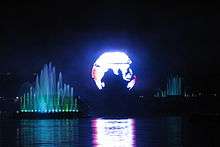
Farmer's greatest achievement, accomplished with brilliant understatement, is to make us gradually realize that our own situation here on Earth is just as mysterious as anything on Riverworld... ~ Robert Anton Wilson
- Excellent science fiction writer; in fact, a far more skillful writer than I am.
- Isaac Asimov, in I, Asimov (1994), p. 504
- One of the most original, one of the most talented, and certainly one of the most fearless writers around.
- Theodore Sturgeon, as quoted in "Philip José Farmer : The Trickster as Artist", by Thomas Lee Wymer, in Voices for the Future, Vol. 2 (1979), edited by Thomas D. Clareson, p. 34
- Farmer's greatest achievement, accomplished with brilliant understatement, is to make us gradually realize that our own situation here on Earth is just as mysterious as anything on Riverworld, or that the answer to the enigmas of Riverworld might also be the explanation of the paradoxes of our own peculiar existence here and now. Once again, in a brilliant climax, Farmer demonstrates my pet theory that sf is the only serious literature around these days, because it is the only literature that grapples with the ultimate questions of who or what we are and how we got here.
- Robert Anton Wilson, in "Wilson on Farmer" in Heavy Metal #54 (September 1981)
- The critics seem like the legendary blind philosophers who each touching the creature in a different place, bring back conflicting reports of what an elephant is. … I would like to suggest, with no pretensions to being any less blind than the others, that a key to these contradictions may be found in what appears to be the image in terms which Farmer most often presents himself as an artist, the trickster god. … Farmer seems to have a special affinity for Trickster.
- Thomas Lee Wymer, in "Philip José Farmer : The Trickster as Artist", in Voices for the Future, Vol. 2 (1979), edited by Thomas D. Clareson, p. 35
External links
- Official website
- International bibliography of Philip José Farmer
- Riverworld bibliography
- An Expansion of Philip José Farmer's Wold Newton Universe
- Philip José Farmer at the Open Directory Project
- Philip José Farmer at Internet Speculative Fiction DataBase
- "Yesterday's Tomorrows : Philip José Farmer" by Graham Sleight from Locus Magazine (February 2008)
This article is issued from
Wikiquote.
The text is licensed under Creative
Commons - Attribution - Sharealike.
Additional terms may apply for the media files.


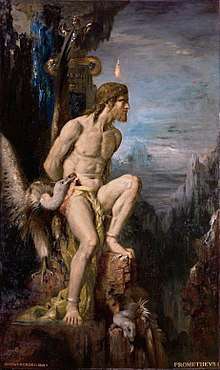
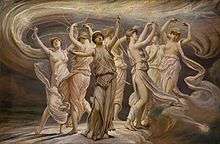
.jpg)


